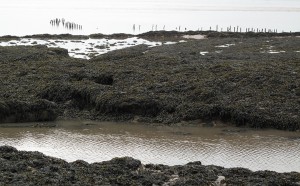In my presentation at this event I spelled out something that it seems to me we need increasingly to understand and act on, as follows:
“Recently the Irish artist Pauline O’Connell described herself, in a barely ironic tone of voice, as a ‘composite cur’. She was referring to the unexpected abilities needed to complete her Drawing the Water project – abilities that far exceeded those conventionally identified with art practice. We know that dogs range from ‘best of breed’ – the product of an economics of exclusivity – through to ‘composite curs’, sometimes valued for their adaptive intelligence and multiple skills. ‘Best of breed’ dogs exist to exemplify a rarefied category set up by the Kennel Club and might serve as an allegory for our hyper-specialized disciplinary culture. ‘Composite curs’ don’t exemplify anything. They thrive on responding to contingency, perhaps reminding us that, in Geraldine Finn’s words: ‘we are always both more and less than the categories that name and divide us’. My assumption here is that, as with dogs, so with people”.
I very much enjoyed working with the group of people selected by Simon Read, Ralf Nuhn, Sue Tapsell, Simon McCarthy (Middlesex) and Chris Wainwright (University of the Arts), since we all had a real interest in the way in which the arts might be used to engage the public more effectively with issues of flooding and climate change more generally. By helping to bring people in the arts into a practically-focused dialogue with hydro-social issues, the organisers have now created a more practical and productive relationship between water professionals, academics engaged in water studies, and appropriate artists.
The event was very positive, with internationally-established artists like Lillian Ball, Tim Collins & Reiko Goto, and Simon Read providing examples of art-led engagement with environmental issues in general and hydro-social issues in particular. It was vital to the event that the attendees were from across the spectrum of possible interested parties – ranging from Tim O’Riordan (Emeritus Professor of Environmental sciences at the University of East Anglia), David Cross (of Cornford and Cross), Heather Shepherd from the National Floods Forum, Julie Steward (an artist working on local waterways), the geographer Caitlin DeSilvey, Antony Lyons (an artist and scientist who formally worked with the Environment Agency), and Fanshawe (an artist and environmentalist working with BirdLife International), in addition to academics and people from relevant national bodies.
It is already clear that some of the links formed are likely to be practically productive and, in addition, reinforce and extend previously existing links in this field created by the PLaCE water seminar I organised with Steven Sodek – at that time in charge of flood policy for bristol City Council – Mel Shearsmith, and Victoria Walters here in Bristol in 2011.
